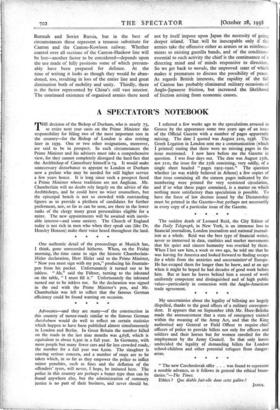A SPECTATOR'S NOTEBOOK
THE decision of the Bishop of Durham, who is nearly 75, to retire next year casts on the Prime Minister the responsibility for filling two of the most important sees in the country—for the Bishop of London is also retiring later in 1939. One or two other resignations, moreover, are said to be in prospect. In such circumstances the Prime Minister and his advisers must take a comprehensive view, for they cannot completely disregard the hard fact that the- Archbishop of Canterbury himself is 74. It would make unnecessary disturbance to appoint to London or Durham now a prelate who may be needed for still higher service a few years hence. It is long since such a prospect faced a Prime Minister whose traditions are not Anglican. Mr. Chamberlain will no doubt rely largely on the advice of the Archbishops, and he could have no wiser counsellors, but the episcopal bench is not so crowded with outstanding figures as to provide a plethora of candidates for further preferment, nor, so far as can be seen, are there in the lOwer ranks of the clergy 'many great personalities eligible for a mitre. The new appointments will be awaited with inevit- able interest—and some anxiety. The Church of England today is not rich in men who when they speak can (like Dr. Hensley Henson) make their voice heard throughout the land.
* * * * One authentic detail of the proceedings -at Munich has, I think, gone unrecorded hitherto. When, on the Friday morning, the time came to sign the historic Chamberlain- Hitler declaration, Herr Hitler said to the Prime Minister, " Now you must sign with my pen," producing his fountain- pen from his pocket. Unfortunately it turned out to be inkless. " Ah," said the Fiihrer, turning to the inkstand on the table, " I must fill it." Unfortunately the inkstand turned out to be inkless too. So the -declaration was signed in the end with the Prime Minister's pen, and Mr. Chamberlain was left to reflect that the famous German efficiency could be found wanting on occasion.
* * * * Advocates—and they are many—of the construction in this country of motor-roads similar to the famous German Autobahnen would do well to reflect on certain statistics which happen to have been published almost simultaneously in London and Berlin. In Great Britain the number killed on the roads in the last nine months was 4,658, which is equivalent to about. 6,3oo in a full year. In Germany, with more people but many fewer cars and far less crowded roads,' the number for a full year was 8,000. The slaughter is causing serious concern, and a number of steps are to be taken which, in so far as they empower the police to inflict minor penalties, such as fines and the deflation of the offenders' tyres, will never, I hope, be imitated. here. The police in this country are perhaps a better .type than can be found anywhere else, but the administration of summary „..
justice is no part of their business, and never should be. I referred a few weeks ago to the ,speculations. aroused in Greece by the appearance, some two years ago of an issue of the Official, Gazette with a number of pages apparently missing. The date I quoted was August 2ist, 1936. , The Greek Legation in London sent me a comniunieation (which I printed) stating that there were no missing pages in the issue mentioned. I now have before me the Gazette in question. I was four days out. The date was August 25th, not 21st, the issue for the 25th consisting, very oddly, of a single sheet headed " pages 1905-1920." The question whether (as was ,widely believed in Athens) d few copies of that issue containing all the sixteen pages indicated by the numbering were printed for very restricted circulation, and if so what those pages contained, is a matter on which nothing more satisfactory than speculation is possible. To have the force of law decrees issued by the Dictatorship must be printed in the Gazette—but perhaps not necessarily in every copy of a particular issue of the Gazette.
* The sudden death of Leonard Reid, the City Editor of the Daily Telegraph, in New York, is an immense loss to financial journalism, London journalism and national journal- ism as a whole. Reid was the best type of financial writer, never so immersed in data, statistics and market 'movements that his quiet and sincere humanity was overlaid by them. When I last saw him, a week or two ago, he told me that 'he was leaving for America and looked forward to finding escape for a while from the anxieties and uncertaintids• of Europe. He has escaped them for longer than he kneNV, and at an age when it might be hoped he had decades of good work before him. But at least he leaves behind him a record of work uniformly competent and distinguished and of high public value—particularly in connexion with the Anglo-American trade agreement.
* - My uncertainties about the legality of billeting are largely dispelled, thanks to the good offices of a military correspon- dent. It appears that on September 28th Mr. Hore-Belisha made the announcement that a state of emergency existed within the meaning of the Army Act, and that the King authorised any General or Field Officer to require chief officers of police to provide billets not only for officers and soldiers and their horses but for women enrolled for the employment by , the Army Council. "So that only leaves undecided the legality of demanding billets for London sehoolchildren and other potential 'refugees from danger- areas.
* " The new Czechoslovak offer . . . was found to represent a notable advance, as it follows in general the ethical boun- daries."The Times.
Ethics ? Que diable fait-elk dans cette gale re ?
jANUS.
























































 Previous page
Previous page